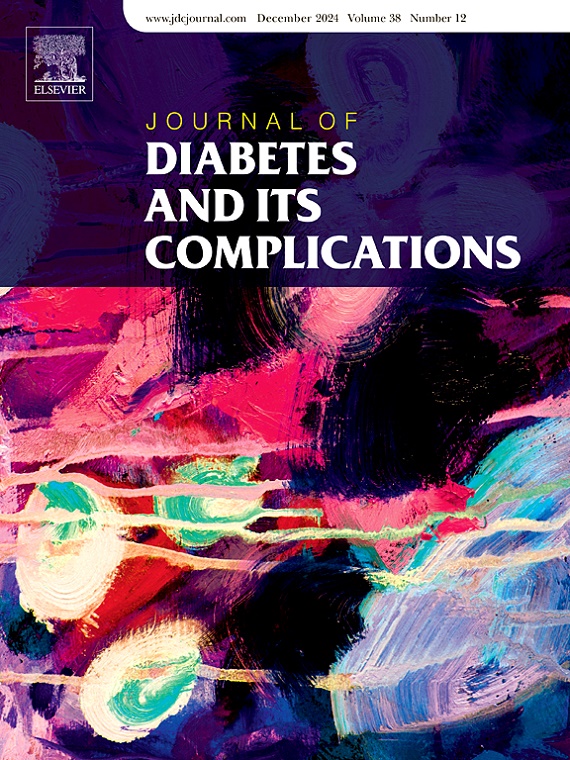The health stage of cardiovascular-kidney-metabolic (CKM) syndrome is useful for predicting all-cause mortality in patients with type 2 diabetes: a cohort study in a period prior to the standard use of recent pharmacotherapy
IF 3.1
3区 医学
Q3 ENDOCRINOLOGY & METABOLISM
引用次数: 0
Abstract
Aim
Cardiovascular-kidney-metabolic (CKM) syndrome is a recently defined systemic condition linking cardiovascular disease, chronic kidney disease and metabolic disorders including type 2 diabetes (T2D). Although the CKM staging has been proposed for integrated risk assessment, its association with all-cause mortality in patients with T2D remains unclear. We investigated the prognosis in patients with T2D assigned by the CKM health stage.
Methods
A total of 632 Japanese patients with T2D were enrolled. The primary endpoint was all-cause death.
Results
The numbers of the recruited patients with stages 2, 3 and 4 were 353 (55.9 %), 116 (18.3 %) and 163 (25.8 %), respectively. During a median follow-up of 64 months (35,327 person-months), 62 patients (9.8 %) died. Kaplan-Meier survival curves analysis showed significant differences in cumulative mortality among CKM health stages (log-rank test: P < 0.001) with higher cumulative mortality in stages 3 and 4 than in stage 2. Multivariable Cox proportional hazard models after adjustment of age, sex, body mass index, current smoking habit, cancer, relevant medications and hemoglobin A1c showed that adjusted hazard ratios (HRs) [95 % confidence intervals] for all-cause death were significantly higher in patients with stages 3 (2.25[1.08–4.69]) and those with stage 4 (2.87[1.41–5.84]) than in those with stage 2 as the reference. After additional adjustment of N-terminal pro-brain natriuretic peptide and estimated glomerular filtration rate among definition criteria for staging, the association of stages with all-cause death remained statistically significant in only stage 4 (2.16[1.02–4.56]).
Conclusion
The CKM health staging is useful for predicting all-cause mortality in Japanese patients with T2D.
心血管-肾脏代谢综合征的健康阶段对预测2型糖尿病患者的全因死亡率是有用的:一项在近期药物治疗标准使用之前的队列研究
心血管肾代谢综合征(CKM)是一种最近被定义的系统性疾病,与心血管疾病、慢性肾脏疾病和包括2型糖尿病(T2D)在内的代谢性疾病有关。尽管CKM分期已被提出用于综合风险评估,但其与T2D患者全因死亡率的关系尚不清楚。我们研究了按CKM健康分期划分的T2D患者的预后。方法共纳入632例日本T2D患者。主要终点是全因死亡。结果2期、3期和4期患者分别为353例(55.9%)、116例(18.3%)和163例(25.8%)。在中位随访64个月(35,327人月)期间,62名患者(9.8%)死亡。Kaplan-Meier生存曲线分析显示CKM各健康阶段的累积死亡率存在显著差异(log-rank检验:P <;0.001), 3期和4期的累积死亡率高于2期。调整年龄、性别、体重指数、当前吸烟习惯、癌症、相关药物及血红蛋白A1c等因素后的多变量Cox比例风险模型显示,3期患者(2.25[1.08-4.69])和4期患者(2.87[1.41-5.84])的全因死亡校正风险比(hr)[95%可信区间]明显高于2期患者。在分期定义标准中额外调整n端脑利钠肽前体和肾小球滤过率后,分期与全因死亡的相关性仅在第4期保持统计学意义(2.16[1.02-4.56])。结论CKM健康分期可用于预测日本t2dm患者的全因死亡率。
本文章由计算机程序翻译,如有差异,请以英文原文为准。
求助全文
约1分钟内获得全文
求助全文
来源期刊

Journal of diabetes and its complications
医学-内分泌学与代谢
CiteScore
5.90
自引率
3.30%
发文量
153
审稿时长
16 days
期刊介绍:
Journal of Diabetes and Its Complications (JDC) is a journal for health care practitioners and researchers, that publishes original research about the pathogenesis, diagnosis and management of diabetes mellitus and its complications. JDC also publishes articles on physiological and molecular aspects of glucose homeostasis.
The primary purpose of JDC is to act as a source of information usable by diabetes practitioners and researchers to increase their knowledge about mechanisms of diabetes and complications development, and promote better management of people with diabetes who are at risk for those complications.
Manuscripts submitted to JDC can report any aspect of basic, translational or clinical research as well as epidemiology. Topics can range broadly from early prediabetes to late-stage complicated diabetes. Topics relevant to basic/translational reports include pancreatic islet dysfunction and insulin resistance, altered adipose tissue function in diabetes, altered neuronal control of glucose homeostasis and mechanisms of drug action. Topics relevant to diabetic complications include diabetic retinopathy, neuropathy and nephropathy; peripheral vascular disease and coronary heart disease; gastrointestinal disorders, renal failure and impotence; and hypertension and hyperlipidemia.
 求助内容:
求助内容: 应助结果提醒方式:
应助结果提醒方式:


